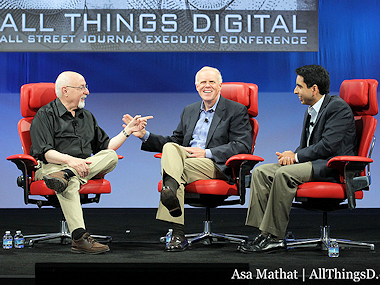Stanford President John Hennessy and Khan Academy’s Salman Khan Talk Education at D10
 We all probably have an opinion on the state of education, but a few in the trenches are coping with its problems and actually trying to fix them. Stanford University President John Hennessy and Salman Khan are two of those people.
We all probably have an opinion on the state of education, but a few in the trenches are coping with its problems and actually trying to fix them. Stanford University President John Hennessy and Salman Khan are two of those people.
The pair took to the stage with Walt Mossberg at D: All Things Digital for a critical session on education. Hennessy runs one of the world’s most influential educational institutions and a huge engine of Silicon Valley growth. First as a professor of electrical engineering and computer science at Stanford, and later as an administrator, Hennessy has worked to keep Silicon Valley and the university closer. And even while serving as president of the university, his research into high-performance computing has continued to push the boundaries of conventional understanding.
Appearing with him was Khan, whose efforts at tutoring his cousin in math led to the video tutorials that, once they went viral on YouTube, led to the creation of the eponymous Khan Academy, which is being used to teach thousands of people in math, science and other subjects everyday. So far, it has been used to deliver 150 million Web lessons, and has evolved into the most-used library of videos on the Web.
Khan discussed a feature that is coming to the site this summer which will have students tutoring other students and earning badge rewards — similar, perhaps, to the badges on Foursquare — for helping each other. “It’s great if you can get 1,600 on your SATs or earn a 4.0 GPA,” Khan said. “But the best thing you can show is that you were the best peer tutor,” and had made an investment in other students.
Hennessy talked about Stanford’s experiments with “flipping the classroom.” It first involved shrinking the size of classes and putting interactive versions of classes online. “Lectures on video are just as boring as traditional lectures,” he said. So, every 15 minutes or so during online lectures, a pop-up quiz is injected as an online check to see how well students are paying attention. The experiments also included adding social media elements to allow students to ask questions of each other. “The phenomenal thing we found in the experiment is that questions would be answered very quickly,” Hennessy said. “This ‘learning together’ movement works very well.”


